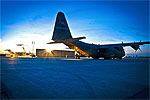C-130 squadron first to perform new airdrop method
 KANDAHAR AIRFIELD, Afghanistan (AFNS) -- The 772nd Expeditionary Airlift Squadron executed the first combat Extracted Container Delivery System, or XCDS, airdrop April 29, successfully demonstrating the increased accuracy that this new technology provides.
KANDAHAR AIRFIELD, Afghanistan (AFNS) -- The 772nd Expeditionary Airlift Squadron executed the first combat Extracted Container Delivery System, or XCDS, airdrop April 29, successfully demonstrating the increased accuracy that this new technology provides.
The new airdrop method is designed to pull the bundles out of the aircraft at a faster rate than the current airdrop process, which improves the overall accuracy of the drop itself.
"Normally a bundle falls out of the aircraft due to gravity, with the speed mostly dependent on the deck angle of the aircraft," said Capt. Raeanna Elms, with the 772nd EAS. "With XCDS, there is an additional parachute attached to a group of bundles, that pulls them out of the aircraft together and at a faster speed, resulting in a smaller dispersion area on the ground."
For the loadmasters working with the CDS bundles, the new method adds more complexity to the rigging inside the aircraft, said Senior Airman Marisa Powers, a loadmaster with the 772nd EAS.
Because of the added complexity, Powers and her fellow loadmaster on the mission were very thorough in their preparations.
"We needed to seriously hit the books more than usual, get in there and read everything a million times and understand," said Powers, who is a Coventry, R.I., native and deployed from the 143rd Airlift Wing of the Rhode Island National Guard. "My partner and I felt like we did a great job, sitting there for a solid two hours and highlighting, saying 'This is what I feel like is important and we'll go over it again tonight.'"
Crews with the 772nd EAS received some XCDS training back at home station before deploying. For Powers, the training included one flight back in the states, plus ground qualification. They came qualified, but the new procedures still had a learning curve.
"It was definitely a little more complicated of a drop," Powers said. "Because it was the first time in theater we obviously didn't want to mess it up, but we went line by line, sentence by sentence to double, triple check that every tie was made right, that every knot was in place."
In the end, it's the mission the crews look toward, she said.
"It's the safety of the guys on the other end receiving it," Powers said. "It's all about helping the guys downrange."
Seeing the bundles pulled out of the back of the aircraft, rather than trickling out as usual, was an unsual sight, Powers said. After the bundles had landed, however, the accuracy of the XCDS drop was proven -- the dispersion of the bundles on the drop zone was about two-thirds smaller, highlighting the value of the XCDS method in having the best placement for the Soldiers.
"Our goal is to get the people on the ground what they need, where they want it," said Elms, who is deployed from Little Rock Air Force Base, Ark. "Plus, since we're trying to build a positive relationship with the local people, we want a more accurate airdrop method that reduces the risk of a stray bundle damaging their homes and crops."